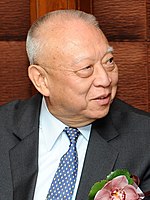Second Tung government
Second Tung Chee-hwa Government | |
|---|---|
 2nd Government of the Hong Kong Special Administrative Region | |
 | |
| Date formed | 1 July 2002 |
| Date dissolved | 12 March 2005 |
| People and organisations | |
| Head of state | Jiang Zemin (until 2003) Hu Jintao (since 2003) |
| Head of government | Tung Chee-hwa |
| No. of ministers | 14 |
| Member parties | DAB, LP, FTU, TA |
| Status in legislature | Pro-Beijing majority |
| Opposition party | Pro-democracy camp |
| History | |
| Election | 2002 Chief Executive election |
| Legislature terms | 2nd Legislative Council 3rd Legislative Council |
| Predecessor | First Tung administration |
| Successor | First Tsang administration |
The Second term of Tung Chee-hwa as Chief Executive of Hong Kong, officially considered part of "The 2nd term Chief Executive of Hong Kong", relates to the period of governance of Hong Kong since the handover of Hong Kong, between 1 July 2002 and 12 March 2005 until Tung Chee-hwa resigned from the office and the rest of the term was taken up by former Chief Secretary for Administration Donald Tsang.
Election
[edit]Incumbent Tung Chee-hwa was nominated by the 800-member Election Committee (EC) without contest despite his declining popularity. The pro-democracy camp argued that the electoral process was deliberately designed to obstruct any challenge to Tung.
Cabinet
[edit]Under the Principal Officials Accountability System introduced by Tung Chee-hwa in July 2002, there were 3 Secretaries of Department and 11 Directors of Bureau. Under the new system, all heads of bureaux became members of the Executive Council, and came directly under the Chief Executive instead of the Chief Secretary or the Financial Secretary.
Ministry
[edit]Two major officials under serve criticisms resigned during the political crisis in July 2003: Financial Secretary Antony Leung resigned in July after the "Lexusgate" scandal and Secretary for Security Regina Ip after the controversial Hong Kong Basic Law Article 23 legislation.
Executive Council non-official members
[edit]The Executive Council was headed by Chief Executive and with total of 19 members: 3 secretaries and 11 directors of the bureaux as official members and 5 non-official members. All non-official members except for Convenor Leung Chun-ying was newly appointed by Tung Chee-hwa.
Tung allied himself with the Democratic Alliance for the Betterment of Hong Kong (DAB) and the Liberal Party,[1] by appointing chairmen of the Liberal Party and DAB, James Tien and Jasper Tsang Yok-sing to the Executive Council to form a "ruling alliance."[2]
On 5 July 2003, James Tien resigned from the ExCo to show objection to the legislation of Hong Kong Basic Law Article 23, after more than 500,000 people marched on 1 July. Tung later on appointed Selina Chow, also from the Liberal Party to replace Tien.
In October 2004, Tung appointed two additional non-official members to the Executive Council.
| Members | Affiliation | Portfolio | Took Office | Left Office | Ref | |
|---|---|---|---|---|---|---|
| CY Leung | Nonpartisan | Non-official Convenor of the ExCo; Chartered surveyor |
1 July 1997 | Tsang I | ||
| Jasper Tsang | DAB | Legislative Councillor | 1 July 2002 | Tsang I | ||
| Cheng Yiu-tong | FTU | General secretary of FTU | 1 July 2002 | Tsang I | ||
| Andrew Liao | Nonpartisan | Former deputy judge of High Court | 1 July 2002 | Tsang I | [3] | |
| James Tien | Liberal | Legislative Councillor | 1 July 2002 | 5 July 2003 | ||
| Selina Chow | Liberal | Legislative Councillor | 22 September 2003 | Tsang I | ||
| Laura Cha | Nonpartisan | Non-executive deputy chairman of HSBC | 19 October 2004 | Tsang I | [4] | |
| Bernard Chan | Alliance | Businessman and politician | 26 October 2004 | Tsang I |
See also
[edit]- First term of Tung Chee-hwa as Chief Executive of Hong Kong
- First term of Donald Tsang as Chief Executive of Hong Kong
References
[edit]- ^ Staff reporter (13 June 2002). "Tung set to strengthen power base". The Standard. Archived from the original on 22 May 2011. Retrieved 23 July 2008.
- ^ Michael DeGolyer (1 January 2003). "Stating the obvious". The Standard. Archived from the original on 30 April 2008. Retrieved 11 January 2007.
- ^ "The Honourable Andrew LIAO Cheung-sing, GBS, SC, JP". Executive Council. Archived from the original on 27 April 2014. Retrieved 2 May 2013.
- ^ "The Honourable Mrs Laura CHA SHIH May-lung, GBS, JP". Executive Council. Retrieved 2 May 2013.[permanent dead link]

